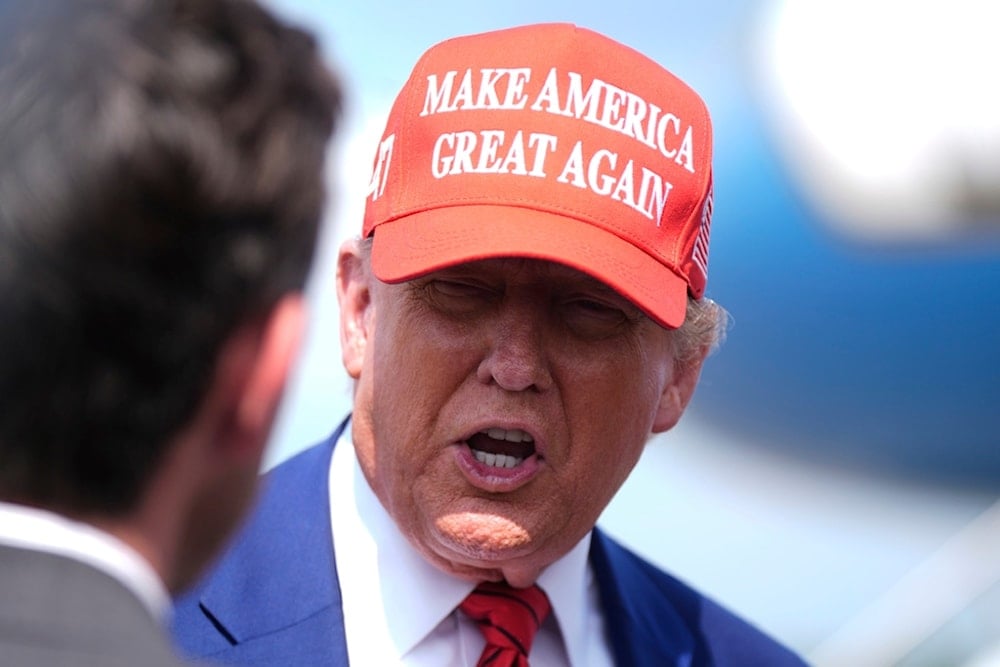Trump hints at ceasefire but says 'hard to stop war'
Trump says a ceasefire between Iran and the Israeli occupation is possible but difficult as he warns against US ground forces in Iran.
-

President Donald Trump speaks with reporters upon arriving at Morristown Municipal Airport in Morristown, New Jersey, Friday, June 20, 2025 (AP)
US President Donald Trump on Friday claimed he might support a ceasefire between "Israel" and Iran, but stressed that it would be difficult to halt the fighting while the Israeli occupation appears to be succeeding militarily.
"I might, depending on the circumstances," Trump told reporters when asked whether he would back a ceasefire. "It’s very hard to stop when you look at it. Israel is doing well in terms of war, and I think you would say that Iran is doing less well. It’s a little bit hard to get somebody to stop."
Trump’s remarks come amid a major escalation between the Israeli occupation and Iran, including deep missile strikes and drone attacks across the region. The US administration has so far signaled support for the Israeli occupation's right to "defend itself" while trying to avoid being drawn into a broader regional conflict.
Trump opposes deploying troops to Iran
When asked about the potential deployment of US ground forces to Iran, Trump firmly rejected the notion, saying, “I’m not going to talk about ground forces. The last thing you want to do is ground forces.”
In a separate exchange, Trump addressed the recent statements and visits by Republican Senator Lindsey Graham and former Secretary of State Mike Pompeo to Ukraine. He criticized their hawkish tone, especially their encouragement of continued conflict with Russia.
"People have to be very careful with what they say," Trump warned. "They got to be very careful with their mouth, because their mouth can get them into a lot of trouble."
Trump’s comments reflect a cautious stance on expanding US military engagement in multiple hotspots, even as his administration maintains a hardline posture toward Iran and remains critical of protracted military entanglements abroad.
Trump's delay exposes Israeli limits
The New York Times on Friday reported that Trump's decision to postpone military action against Iran has placed "Israel" in a precarious position, revealing the limits of its military reach and increasing pressure on its overstretched defense systems.
For days, Israeli officials had anticipated American intervention to help strike Iran's Fordow nuclear facility, a peaceful enrichment site deeply embedded in the mountains of northern Iran.
According to analysts cited by NYT, only the US possesses the specialized bunker-busting bombs capable of damaging such a site. But with Trump choosing to delay any decision for up to two weeks, "Israel" is left to confront its own limitations.
This hesitation from Washington reflects a broader strategic truth, that "Israel" is unable to neutralize Iran's nuclear infrastructure without external help. While Prime Minister Benjamin Netanyahu claimed, "We will achieve all of our objectives, all of their nuclear facilities. We have the power to do so," Israeli military analysts have openly acknowledged the shortcomings.
Itamar Rabinovich, a former Israeli ambassador to the US, stated plainly, "It probably won't be on the scale of what the US can achieve. If we could do what the US can, we would have already done it."
Gambling desperation
Despite this pressure, Netanyahu continues to float increasingly reckless options, including a potential unilateral assault on Fordow or a ground sabotage mission.
Some within the Israeli establishment have even resorted to public threats of forcing a change of leadership in Iran and assassination, with calls to target Sayyed Ali Khamenei himself, rhetoric that reflects desperation rather than strategic clarity.
NYT also noted that Israeli media and polling data show continued domestic support for the military campaign, reporting that Netanyahu's Likud Party is currently enjoying its strongest polling position since the start of the war on Gaza.
Read more: Iran's response showed 'Israel' as 'paper tiger': Venezuelan minister

 4 Min Read
4 Min Read









